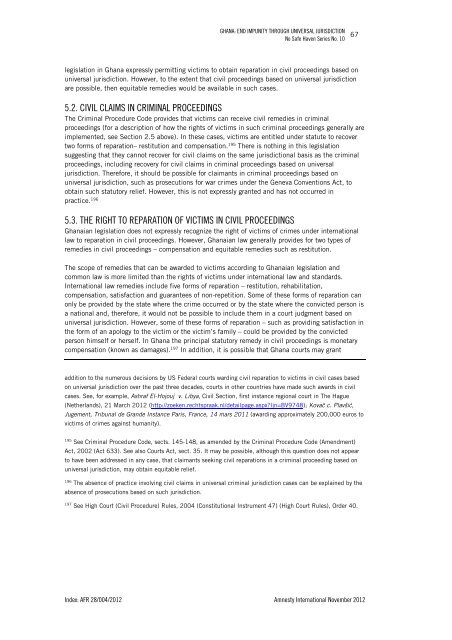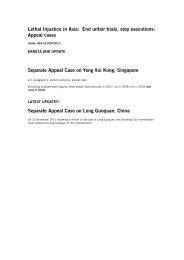Ghana - Amnesty International
Ghana - Amnesty International
Ghana - Amnesty International
Create successful ePaper yourself
Turn your PDF publications into a flip-book with our unique Google optimized e-Paper software.
GHANA: END IMPUNITY THROUGH UNIVERSAL JURISDICTIONNo Safe Haven Series No. 1067legislation in <strong>Ghana</strong> expressly permitting victims to obtain reparation in civil proceedings based onuniversal jurisdiction. However, to the extent that civil proceedings based on universal jurisdictionare possible, then equitable remedies would be available in such cases.5.2. CIVIL CLAIMS IN CRIMINAL PROCEEDINGSThe Criminal Procedure Code provides that victims can receive civil remedies in criminalproceedings (for a description of how the rights of victims in such criminal proceedings generally areimplemented, see Section 2.5 above). In these cases, victims are entitled under statute to recovertwo forms of reparation– restitution and compensation. 195 There is nothing in this legislationsuggesting that they cannot recover for civil claims on the same jurisdictional basis as the criminalproceedings, including recovery for civil claims in criminal proceedings based on universaljurisdiction. Therefore, it should be possible for claimants in criminal proceedings based onuniversal jurisdiction, such as prosecutions for war crimes under the Geneva Conventions Act, toobtain such statutory relief. However, this is not expressly granted and has not occurred inpractice. 1965.3. THE RIGHT TO REPARATION OF VICTIMS IN CIVIL PROCEEDINGS<strong>Ghana</strong>ian legislation does not expressly recognize the right of victims of crimes under internationallaw to reparation in civil proceedings. However, <strong>Ghana</strong>ian law generally provides for two types ofremedies in civil proceedings – compensation and equitable remedies such as restitution.The scope of remedies that can be awarded to victims according to <strong>Ghana</strong>ian legislation andcommon law is more limited than the rights of victims under international law and standards.<strong>International</strong> law remedies include five forms of reparation – restitution, rehabilitation,compensation, satisfaction and guarantees of non-repetition. Some of these forms of reparation canonly be provided by the state where the crime occurred or by the state where the convicted person isa national and, therefore, it would not be possible to include them in a court judgment based onuniversal jurisdiction. However, some of these forms of reparation – such as providing satisfaction inthe form of an apology to the victim or the victim’s family – could be provided by the convictedperson himself or herself. In <strong>Ghana</strong> the principal statutory remedy in civil proceedings is monetarycompensation (known as damages). 197 In addition, it is possible that <strong>Ghana</strong> courts may grantaddition to the numerous decisions by US Federal courts warding civil reparation to victims in civil cases basedon universal jurisdiction over the past three decades, courts in other countries have made such awards in civilcases. See, for example, Ashraf El-Hojouj v. Libya, Civil Section, first instance regional court in The Hague(Netherlands), 21 March 2012 (http://zoeken.rechtspraak.nl/detailpage.aspx?Ijn=BV9748); Kovač c. Plavšić,Jugement, Tribunal de Grande Instance Paris, France, 14 mars 2011 (awarding approximately 200,000 euros tovictims of crimes against humanity).195See Criminal Procedure Code, sects. 145-148, as amended by the Criminal Procedure Code (Amendment)Act, 2002 (Act 633). See also Courts Act, sect. 35. It may be possible, although this question does not appearto have been addressed in any case, that claimants seeking civil reparations in a criminal proceeding based onuniversal jurisdiction, may obtain equitable relief.196The absence of practice involving civil claims in universal criminal jurisdiction cases can be explained by theabsence of prosecutions based on such jurisdiction.197See High Court (Civil Procedure) Rules, 2004 (Constitutional Instrument 47) (High Court Rules), Order 40.Index: AFR 28/004/2012 <strong>Amnesty</strong> <strong>International</strong> November 2012
















